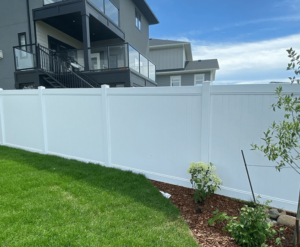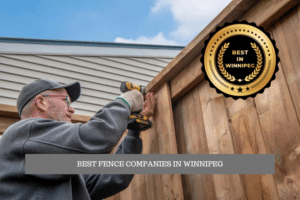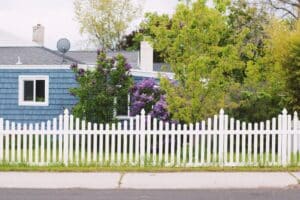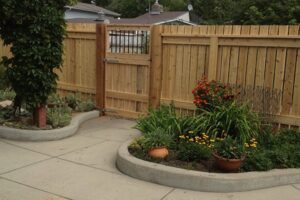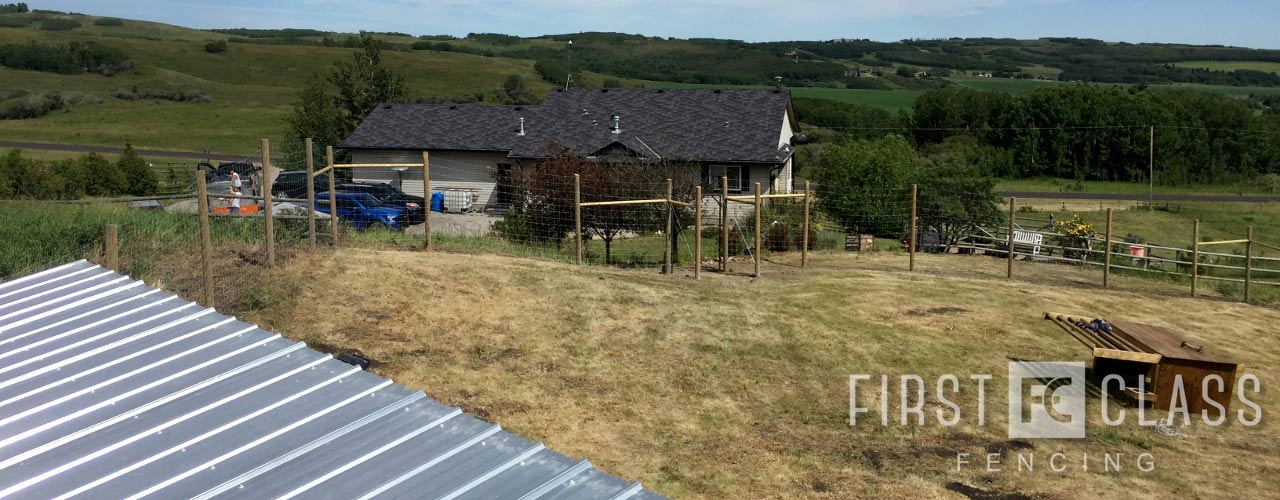
If you own a rural property, your choice of fence will affect the safety and security of your livestock or produce, as well as the beauty of your property.
Dotted around the Calgary region, we see several different types of farm fence that appear again and again.
However, there are more than ten styles available and your choice depends on many factors.
You may need more than one type – for instance, a perimeter fence to keep the cattle in and a garden fence to keep them away from your plants,
So, what exactly are your choices? And what factors do you need to consider before selecting the right type of fence to install?
Table of Contents
ToggleKey considerations before choosing your farm fence
Your farm fence will likely do more than simply mark the boundaries of your property.
It will serve many purposes, so let’s first look at the factors that almost every farm owner will need to consider before even starting to look at fencing materials and styles.
Your budget
Farms often cover large areas. That means the investment in your fence could be significant and it’s important to get your choice right. With such large-scale fencing projects, consider the budget you are prepared to allocate.
The type of farm you have
A basic consideration with a farm fence is what type of farm you have: is it mainly for livestock or fresh produce? Different types of farms need to protect against different types of threats and your fence can help or hinder this.
Strength and durability requirements
With such a significant investment, you want your fence to last. A key consideration is the amount of wear and tear it will be subjected to – livestock and horses may be tough on farm fences. If you have a problem with wild game intrusions, you may need extra strength in your fence.
Style preferences
You may have your heart set on a particular style of farm fence – or be open to the many choices available. If the appearance of your fence is as important as its functionality, this needs to be taken into account when considering your choices.
Privacy and security requirements
How important are security and privacy? In many rural properties, privacy is rarely a major issue like it is in city properties but nobody wants a fence that makes their farm look like it’s lacking security.
Each of these considerations – plus the impact of the harsh elements in this part of the world (cold, sun, wind, rain, hail, snow, ice) – will influence your decision of farm fence.
Now, let’s take a look at the main fence options available for protecting your farm.
The main types of farm fence in Calgary
The following types of fences are broken down by fence material, as this is the single biggest factor that affects the style, durability, and cost of your farm fence.
Wooden fences
Wood provides many great options for farm fences:
- Post & plank fence – a traditional farm fence consisting of three horizontal wood planks running the length of the fence with vertical wooden posts for added stability. Ideal as a horse or cattle fence.
- Post & rail fence – provides a classic “prairie” look with three horizontal rails (wood or galvanized steel) running the length of the fence and posts added for stability. Another great choice for livestock fencing.
- Top rail fence – another rustic fence providing an open view of the landscape, with one horizontal wooden top rail with vertical wooden posts added for stability. Wires may be added in between the posts.
- Split cedar fence – provides an “Old West” appeal, is environmentally friendly, and also virtually maintenance-free. However, it comes at a higher outlay than other types of wooden cattle fences.
Barbed-wire fences
Galvanized barbed wire is commonly used on Calgary farms, especially as a cost-effective and practical option for cattle pastures and enclosures. They are generally cheaper than post and rail fences but do not provide the traditional style.
High-tensile wire fences
This is smooth wire pulled at very high tension and supported by heavy posts. It can be used for either temporary or permanent farm fencing and its strength means that it is suitable for livestock. If the electrification option is added, it is especially effective.
Page wire fences
Page wire is galvanized wire knotted or welded into rectangles, creating a continuous mesh. This is connected to wooden or steel posts. These fences provide excellent strength for livestock like horses, cows, dogs, goats, pigs, and sheep.
Chain-link fences
A chain-link fence provides an affordable and secure way to protect certain areas of your property (e.g. a garden or a dog kennel) or to delineate the entire property and prevent wild game or intruders from entering.
Vinyl fences
Vinyl fences can do all the things that wood can do but with less maintenance (no painting, insect-protection or staining required). They are ideal for large properties with livestock or horses or even to protect smaller areas like gardens, but they do generally come at a higher cost than wood.
Remember, there is a fence type suited to every purpose on your farm. Do your homework first and it will help you choose the right fence to provide the necessary protection for all areas of your property.

